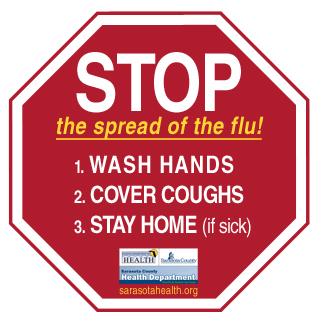Health And Fitness
Influenza Activity Increasing in Benton County
Surveillance by the Iowa Department of Public Health and Benton County Public Health, and testing by the State Hygienic Laboratory indicate flu activity is increasing. The flu season typically peaks in February and can last as late as May. “If you have flu symptoms, help out your family, friends and co-workers by staying home to avoid spreading the virus,” said Benton County Public Health Director Melissa Smith.
It's Never Too Late
We’ve all heard that exercise is good for you. Did you know that it’s as true for older people as it is for any age group? You’re never too old to get moving, get stronger and improve your health.
Fitting exercise and physical activity into your day can enhance your life in so many ways. Regular physical activity can improve your balance and boost or maintain your strength and fitness.
Unsafe Infant Bedding Use Still Common
Bedding such as thick blankets, quilts, and pillows can block an infant’s airway, leading to unintentional sleep-related suffocation. This type of bedding can also increase the risk of sudden infant death syndrome (SIDS), the unexplained death of a child within the first year of life.
Infants should be placed to sleep alone, on their backs, on a firm sleep surface, such as on a mattress in a safety-approved crib, covered by a fitted sheet.
Why Create a Family Health History?
A family health history is a written record of a family's health. The history contains information about a family's medical conditions, lifestyle habits (for example, whether anyone in the family has smoked), and where and how family members grew up. It's like a family tree for health.
What a Family Health History May Reveal
You can use a family health history to see if you, your children, or your grandchildren might face an increased risk of developing serious health problems.
What are the symptoms of the flu?
 Based on early data, the 2014-2015 flu season could be severe. Protect yourself and your family against seasonal flu. Getting vaccinated and taking everyday precautions—like washing your hands, covering your cough, and staying away from sick people—are the best ways to keep yourself healthy this flu season.
Flu symptoms include:
-A 100F or higher fever or feeling feverish (not everyone with the flu has a fever)
-A cough and/or sore throat
-A runny or stuffy nose
-Headaches and/or body aches
-Chills
-Fatigue
-Nausea, vomiting, and/or diarrhea (most common in children)
Do I have the flu or a cold?
The flu and the common cold have similar symptoms.
Based on early data, the 2014-2015 flu season could be severe. Protect yourself and your family against seasonal flu. Getting vaccinated and taking everyday precautions—like washing your hands, covering your cough, and staying away from sick people—are the best ways to keep yourself healthy this flu season.
Flu symptoms include:
-A 100F or higher fever or feeling feverish (not everyone with the flu has a fever)
-A cough and/or sore throat
-A runny or stuffy nose
-Headaches and/or body aches
-Chills
-Fatigue
-Nausea, vomiting, and/or diarrhea (most common in children)
Do I have the flu or a cold?
The flu and the common cold have similar symptoms. January WOW (Words on Wellness) Newsletter
Click To View
12 Ways to Have a Healthy Holiday Season
 Brighten the holidays by making your health and safety a priority. Take steps to keep you and your loved ones safe and healthy—and ready to enjoy the holidays.
1. Wash hands often to help prevent the spread of germs. It's flu season. Wash your hands with soap and clean running water for at least 20 seconds.
2. Manage stress. Give yourself a break if you feel stressed out, overwhelmed, and out of control.
Brighten the holidays by making your health and safety a priority. Take steps to keep you and your loved ones safe and healthy—and ready to enjoy the holidays.
1. Wash hands often to help prevent the spread of germs. It's flu season. Wash your hands with soap and clean running water for at least 20 seconds.
2. Manage stress. Give yourself a break if you feel stressed out, overwhelmed, and out of control. 5 tips for a safe holiday party
By David Condry, Project Coordinator
Benton County Above the Influence Coalition
During the holidays, many people look forward to celebrating with their family and friends, and serving alcohol is often a part of that celebration. To ensure that everyone remains safe and enjoys their holiday gatherings, it is always important to take the extra time for necessary planning.
Cold, Flu, or Allergy?
You’re feeling pretty lousy. You’ve got sniffles, sneezing, and a sore throat. Is it a cold, flu, or allergies? It can be hard to tell them apart because they share so many symptoms. But understanding the differences will help you choose the best treatment.
“If you know what you have, you won’t take medications that you don’t need, that aren’t effective, or that might even make your symptoms worse,” says NIH’s Dr.
Donations Increase, More Lives Saved
 We frequently hear about blood drives and the supply needs of our community but rarely do we learn about the impact of our giving community. In the past two years the blood drives held at Virginia Gay Hospital and Clinics have yielded more than 250 pints of blood.
Blood donated in our community stays in our community and that’s an incredible asset for a rural hospital.
We frequently hear about blood drives and the supply needs of our community but rarely do we learn about the impact of our giving community. In the past two years the blood drives held at Virginia Gay Hospital and Clinics have yielded more than 250 pints of blood.
Blood donated in our community stays in our community and that’s an incredible asset for a rural hospital.